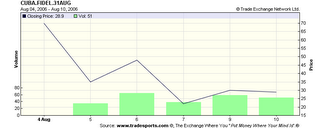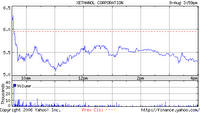The growth in market for credit default swaps (CDS) over the last 10 years or so has been nothing short of phenomenal. For the uninitiated, a CDS is a contract that allows parties the ability to transfer or trade the risk that a borrower may default on its obligations. They're usually traded "off exchange" (i.e. in the "over the counter" market) and are typically done as private deals between two parties. In a typical swap, Party A agrees to pay Party B an annual fee for a set period of time. In exchange, Party B agrees to pay Party A a lump sum in the event of a "credit event" (most typically, a default) during that time. So, it's more like an insurance policy that a typical derivative like a put or call option.
According to an article in today's Wall Street Journal, titled "Can Anyone Police the Swaps?", there's a good chance that informed traders are using this market to capitalize on their private information. However, there's some question as to who gets to regulate this market:
Unusual trading in a relatively new corner of the bond market illustrates how the rise of increasingly sophisticated financial instruments is potentially outpacing the ability of regulators to police them. In recent months, there have been spikes in the prices of so-called credit-default swaps, which are a kind of default insurance on debt, popular among banks, hedge funds and other big investors. In some prominent cases recently -- including deals involving hospital operator HCA Inc. (ticker: HCA) and energy company Anadarko Petroleum Corp. (Ticker: APC) -- prices of the swaps climbed in the weeks before news of major acquisitions became public.
That raises the possibility that some traders might have acted on inside information.
![[swaps]](https://lh3.googleusercontent.com/blogger_img_proxy/AEn0k_vP_A78sxGCvgfua23_xNPaJTPmuaeMkKVA1X8H4usH76YUkQvom6RUKH3tJvPgNmYhtR8MtiQ6VrtfnOBxzLbaq_g_xpylk6IsqNC3PuHwDGAxCJNTTPyBJZJ1tHZs5oavwXYheBblkiGUh-Vv1G9B8Vc=s0-d)
...There is no evidence at this point that improper inside information was leaked. Proving insider trading has always been a challenge for regulators, even in traditional securities. But the recent activities raise questions as to which regulator, if any, is policing the market, and how they will go about it as these exotic instruments spread.
Here's an example of the price patterns of CDSs from the article (it goes with the graph above):
Prices on credit-default swaps for HCA rose by a third in the weeks before reports appeared saying the company was in talks to be sold to a group of private investors. An investor who wanted to be sheltered from a default of $10 million in HCA bonds over five years had to pay around $130,000 annually for such coverage in June.
That price climbed to around $170,000 in the days before news of a possible deal, and then soared to more than $400,000 after one was unveiled.
A similar pattern occurred before Anadarko's $21 billion cash offer in June for two companies, Kerr-McGee Corp. and Western Gas Resources Inc. In both the HCA and Anadarko transactions, the deals increased the acquiring company's financial risk and thus made the swaps more valuable.
Read the whole thing
here.
It's an interesting article for a couple of reasons. First, because it illustrates that markets develop much faster than regulators can follow. So, when there's a new financial innovation, it invariably takes regulators a while to figure out all the issues involved. In this case, although default swaps have been trading for 10 years, it's still unclear who the controlling regulatory body is. My guess is that there'll eventually be a turf war as the various potential overseers all claim jurisdiction over the contracts.
I wouldn't be surprised in the slightest if Eliot Spitzer tries to make a case out of it. After all, he is one of the great publicity whores of our times, and he's shown an amazing ability to shoehorn his way into cases where he has no right to play a part (as evidenced by his terrible record in cases where the defendants actually contested the claims rather than settle before trial).
It's also interesting because it's another example of how market prices reveal information. Since the payoffs to credit default are entirely determined by default probabilities, they're the preferred market for informed traders to use to capitalize on their information. If you want to see some academic research on this topic, there's a paper on SSRN by Acharya and Johnson titled "Insider Trading in Credit Derivatives." Here's the abstract:
Insider trading in the credit derivatives market has become a significant concern for regulators and participants. This paper attempts to quantify the problem. Using news reflected in the stock market as a benchmark for public information, we report evidence of significant incremental information revelation in the credit default swap (CDS) market under circumstances consistent with the use of non-public information by informed banks. Specifically, the information revelation occurs only for negative credit news and for entities that subsequently experience adverse shocks. Moreover the degree of advance information revelation increases with the number of banks that have lending/monitoring relations with a given firm, and this effect is robust to controls for non-informational trade. We find no evidence, however, that the degree of asymmetric information adversely affects prices or liquidity in either the equity or credit markets. If anything, with regard to liquidity, the reverse appears to be true
Read the whole thing
here.
In short, they find that there's significant information about default risks that shows up in the CDS market before it does in the stock market.
That's why I love being an academic in this field - there's always more to learn, and new developments are always occurring. So even if I COULD learn everything there currently is to know (which is unlikely, since I'm a Bear of Very Little Brain), there would still be new things to learn tomorrow.
And believe it or not, they pay me for this. What a life.
Update: Larry Ribstein weighs in with his usual good commentary
here. He points out (correctly) that the big problem with insider trading is the possible concern that it might drive out liquidity. And the Acharya and Johnson piece finds no evidence that insider trading in the CDS market adversely affects either prices or liquidity (in fact, it's just the opposite).

